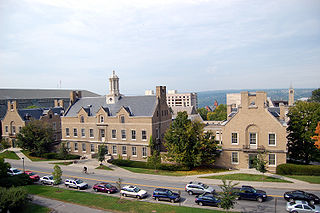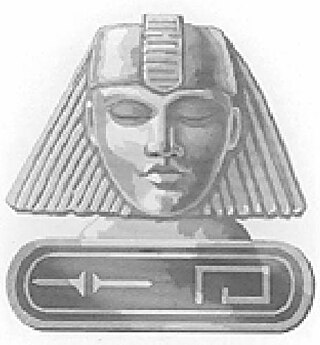Related Research Articles
The National Academy of Medicine (NAM), known as the Institute of Medicine (IoM) until 2015, is an American nonprofit, non-governmental organization. The National Academy of Medicine is a part of the National Academies of Sciences, Engineering, and Medicine, along with the National Academy of Sciences (NAS), National Academy of Engineering (NAE), and the National Research Council (NRC).

The New York State School of Industrial and Labor Relations at Cornell University (ILR) is an industrial relations school and one of Cornell University's four statutory colleges. The School has five academic departments which include: Labor Economics, Human Resource Management, Global Labor and Work, Organizational Behavior, and Statistics & Data Science.

The New York State College of Agriculture and Life Sciences at Cornell University is one of Cornell University's four statutory colleges, and is the only College of Agriculture and Life Sciences in the Ivy League. With enrollment of approximately 3,100 undergraduate and 1,000 graduate students, CALS is Cornell's second-largest undergraduate college and the third-largest college of its kind in the United States.

The College of Arts and Sciences is a division of Cornell University. It has been part of the university since its founding, although its name has changed over time. It grants bachelor's degrees, and masters and doctorates through affiliation with the Cornell University Graduate School. Its major academic buildings are located on the Arts Quad and include some of the university's oldest buildings. The college offers courses in many fields of study and is the largest college at Cornell by undergraduate enrollment.

Frank Rattray Lillie was an American zoologist and an early pioneer of the study of embryology. Born in Toronto, Ontario, Canada, Lillie moved to the United States in 1891 to study for a summer at the Marine Biological Laboratory (MBL) in Woods Hole, Massachusetts. Lillie formed a lifelong association with the laboratory, eventually rising to become its director in 1908. His efforts developed the MBL into a full-time institution.

The history of Cornell University begins when its two founders, Andrew Dickson White of Syracuse and Ezra Cornell of Ithaca, met in the New York State Senate in January 1864. Together, they established Cornell University in Ithaca, New York, in 1865. The university was initially funded by Ezra Cornell's $400,000 endowment and by New York's 989,920-acre (4,006.1 km2) allotment of the Morrill Land Grant Act of 1862.
Charles Francis Van Loan is an emeritus professor of computer science and the Joseph C. Ford Professor of Engineering at Cornell University, He is known for his expertise in numerical analysis, especially matrix computations.

Herbert John Webber was an American plant physiologist, professor emeritus of sub-tropical horticulture, first director of the University of California Citrus Experiment Station, and the third curator of the University of California Citrus Variety Collection. Webber was the author of several publications on horticulture, member of numerous professional horticultural and agricultural associations. He coined the word "clone" in 1903 and was the first to use it to describe a colony of organisms derived asexually from a single progenitor.

The Joan & Sanford I. Weill Medical College of Cornell University is Cornell University's biomedical research unit and medical school in New York City.
The Cornell University Department of History is an academic department in the College of Arts and Sciences at Cornell University that focuses on the study of history. Founded in 1868, it is one of Cornell's original departments and has been a center for the development of professional historical research institutions in the United States, including the American Historical Association and the American Historical Review. It remains a highly-ranked program in the field and its alumni and faculty have won Nobel and Pulitzer Prizes, among other distinctions. In addition, many of Cornell's presidents have served among its ranks.
Justin DuPratt White (1869–1939) was an American attorney best known for co-founding the White & Case law firm. In 1939 he was chairman of the Cornell University Board of Trustees.

The Sphinx Head Society is the oldest senior honor society at Cornell University. Sphinx Head recognizes Cornell senior men and women who have demonstrated respectable strength of character on top of dedication to leadership and service at Cornell University. In 1929 The New York Times held that election into Sphinx Head and similar societies constituted "the highest non-scholastic honor within reach of undergraduates."
The New York State College of Forestry at Cornell was a statutory college established in 1898 at Cornell University to teach scientific forestry. The first four-year college of forestry in the country, it was defunded by the State of New York in 1903, over controversies involving the college's forestry practices in the Adirondacks. Forestry studies continued at Cornell even after the college's closing.
George K. Fraenkel was an American physical chemist, dean of Graduate School of Arts and Sciences and chairman of the chemistry department at Columbia University. Fraenkel was noted for his research of electron spin resonance. He also pioneered in the use of electronic techniques to study structures of molecules.

Professor Andrew William John Thomson, OBE, FBAM was a British academic and historian who specialized in management education and industrial relations.

Martha Elizabeth Pollack is an American computer scientist who has served as the 14th president of Cornell University since April 2017. Previously, she served as the 14th provost and executive vice president for academic affairs of the University of Michigan from 2013 to 2017.
Roger Conant Cramton was appointed by President Richard M. Nixon to be chairman of the Administrative Conference of the United States in 1970, and in 1972 became the assistant attorney general in charge of the Office of Legal Counsel in the Department of Justice. He was known for voicing opposition to Nixon during the Watergate scandal.
Alison G. Power is an American biologist. She is a professor in the Department of Ecology and Evolutionary Biology at Cornell University in Ithaca, New York. Her research investigates disease ecology in plant communities, both natural and agricultural, across the U.S., Central America, Southeast Asia, and Africa.
David Pimentel was an American entomologist. He was a professor of Insect Ecology & Agricultural Sciences in the Department of Entomology and Section of Ecology and Systematics at Cornell University. He made contributions in ecology, entomology, agriculture, biotechnology, conservation, and environmental policy. He was recognized as an international authority on many important interactions between humans and the environment. He published over 700 scientific items, of which 37 are books, and served on many national and government committees, including the National Academy of Sciences, the President's Science Advisory Council, the Office of Technology Assessment of the U.S. Congress, the U.S. State Department, and the Departments of Agriculture, Energy, and Health, Education and Welfare. Pimentel served on committees for many national and government organizations, including the Secretary's Commission On Pesticides And Their Relationship To Environmental Health which issued a report in 1969 that recommended the banning of DDT and led to the creation of the EPA.
Lance Collins is an engineer and professor for mechanical and aerospace engineering at Virginia Tech. He was previously the Joseph Silbert Dean of Engineering at the Cornell University College of Engineering and is now the inaugural vice president and executive director of the new Virginia Tech Innovation Campus.
References
- ↑ "Dean Palm to Resign". Cornell Daily Sun. Sep 1, 1971. p. 6. Retrieved 2009-11-06.
- ↑ Overstreet, William (Nov 10, 1969). "Dean Urges Limited DDT Usage". Cornell Daily Sun. p. 1. Retrieved 2009-11-06.
- ↑ "Charles E. Palm, retired agriculture dean, is dead at 84". Cornell Chronicle. March 7, 1996. Archived from the original on 2010-07-22. Retrieved 2009-11-06.
- ↑ "Palm Chosen as Head". Cornell Daily Sun. Oct 1, 1965. p. 8. Retrieved 2009-11-06.